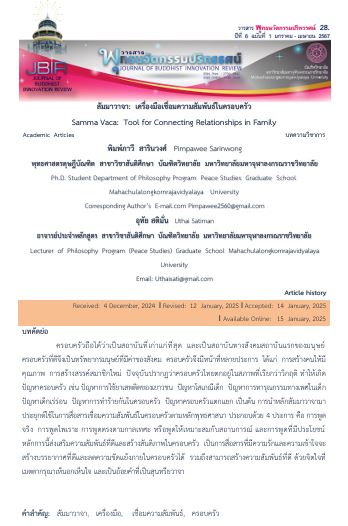Samma Vaca: Tool for Connecting Relationships in Family
Main Article Content
Abstract
The family is considered to be the oldest institution. And it is the first social institution of human beings. A good family is therefore a valuable human resource of society. The family therefore has many duties, including creating quality people. Creation of new members. At present, it appears that Thai families are in a state of crisis. This causes family problems, such as drug use among youth. child prostitution problem The problem of sexual abuse in children Homeless child problem Problems of abuse in the family Family problems, separation, etc. Applying the principles of right speech to communication to build family relationships according to Buddhist principles consists of 4 things: speaking truthfully, speaking beautifully, and speaking according to the occasion. or speak appropriately to the situation and useful speech. This principle promotes good relationships and peace in the family. Communication with love and understanding will create a good atmosphere and reduce conflict within the family. including being able to build good relationships With a heart of kindness and compassion. and are words that are aesthetically pleasing
Article Details

This work is licensed under a Creative Commons Attribution-NonCommercial-NoDerivatives 4.0 International License.
เรื่องลิขสิทธิ์/เป็นความคิดเห็นของผู้เขียน
References
Books:
Bertrand L. (1958). Rural Sociology. New: Mc Graw-Hill.
Kor Sawatphanit. (1976). Family Relations. Bangkok: Thaiwattanapanich.
Mahachulalongkornrajavidyalaya. (1996). Thai Tripitaka. Bangkok: MCU Press.
Narong Sengpracha. (1998). Man and Society. 4th edition. Bangkok: O.S. Printing House.
Ngamphit Satsa-nguan. (2002). Family Institute of Ethnic Groups in Bangkok: A Case Study of the Thai Song Family. Bangkok: Chulalongkorn University.
Ngamphit Satsa-nguan. (2002). Family Institute of Ethnic Groups in Bangkok: A Case Study of the Thai Song Family. Bangkok: Chulalongkorn University.
National Women's Promotion and Coordination Committee (WOMEN's Promotion and Coordination Committee). (1998). Office of the Permanent Secretary, Office of the Prime Minister, Policy and Plan for the Development of Family Institutions. Bangkok:
Office of the Women's Promotion and Coordination Committee (Women's Promotion and Coordination Committee (WMO).
Niyom Bunmee. (1987). Lifestyle Problems. Bangkok: Srinakharinwirot University.
Narong Sengpracha. (1998). Man and Society. 4th edition. Bangkok: O.S. Printing House.
Supattra Suphap. (1999). Sociology. 21st edition. Bangkok: Thaiwattanapanich.
Sasipat Yodphet. (1997). Family Institute from the Perspective of Social Welfare Professionals. Bangkok: J. PRINT.
Suwit Rungvisai. (1983). Social Problems. Chiang Mai: Duangtawan Printing.
Suwit Rungvisai. (1989). Social Bonds. Chiang Mai: Department of Sociology and Anthropology Chiang Mai University.
Thesis
Krabi Cholawit. (2000). Quality Family in the View of Thai Military Bank Employees in Bangkok. Master of Social Work. Thesis. Graduate School: Thammasat University.
Weeraphon Yai-arun. (1999). Factors affecting police family violence Study only the case of non-commissioned police officers performing duties in the Metropolitan Police Station. Master of Social Work. Thesis Graduate School: Thammasat University.
Yosaporn Pattanakul. (1997). Study of perspectives on being a foster family: Studying only the case of families in Rangsit Community Housing. Village No. 2, Rangsit Subdistrict. Thanyaburi District, Pratum Thani Province. Master of Social Work .Thesis Graduate School: Thammasat University.


